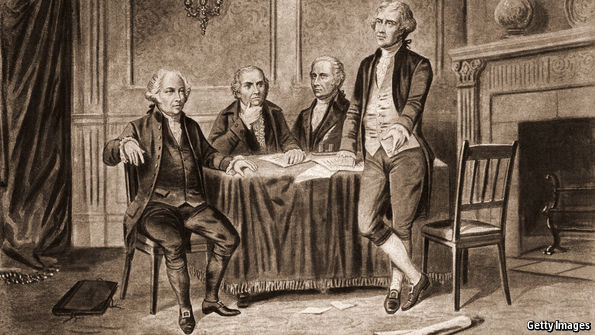I say within 2 years, because he can't separate hi
Post# of 65629
Be easy if someone would read him the appropriate part of the Constitution, maybe.
Meanwhile, I'm more curious about Comey's 'thought process' in not revealing intelligence agency conclusions about Russian interference on behalf of Trump VS his urgency Re Clinton's emails.
Quote:
What is the Emoluments Clause?
Dec 4th 2016, 23:00 by M.S.

DIPLOMATS from various countries have spent the past few weeks booking suites at the Trump International Hotel in Washington in the hope of ingratiating themselves with president-elect Donald Trump. The Industrial and Agricultural Bank of China, whose majority stakeholder is the Chinese government, rents office space in New York City’s Trump Tower.
The 35-storey Trump Office Buenos Aires development is awaiting approval from that city’s government. These are just a few of the unprecedented conflicts of interest presented by Mr Trump’s decision to retain his business empire and hand its management over to his children.
No law obliges Mr Trump to sell his assets or place them in a blind trust, though nine of the 12 presidents since the second world war have done so. But when his businesses accept money (or anything of value) from foreign governments or state-owned entities, Mr Trump may nevertheless be breaking the law.
In fact, he may be violating the Constitution of the United States—and specifically, a section known as the Emoluments Clause.
Article I, Section 9, Clause 8 of the constitution states that no American officeholder shall, “without the consent of the Congress, accept of any present, emolument, office, or title, of any kind whatever, from any king, prince, or foreign state.”
The clause is no weird historical quirk. Gordon Wood, an American historian, argues that America’s founding fathers were obsessed with the problem of corruption, which they believed had doomed earlier republics.
They saw it as an element of aristocratic and monarchical rule, which confused public functions (officeholders) with private personages (nobility). When the king of England granted titles and salaries to loyalists, wrote John Adams, America’s second president, it turned the crown itself into a “private interest”. Preventing such conflicts of interest was vital to the survival of the new state.
Foreign gifts to American government representatives were of particular concern, writes Zephyr Teachout, an American law professor, in her book “Corruption in America”. King Louis XVI of France liked to present gilded snuff boxes to favoured diplomats such as Benjamin Franklin, who received one encrusted with 408 diamonds.
This caused some scandal among the egalitarian Americans. They looked to another young republic, the Netherlands, which in 1651 had adopted a ban on gifts for its ambassadors unless they were declared and approved by parliament. Most countries considered the Dutch rule puritanical nonsense, since such gifts were routine in diplomacy. But the Americans were intrigued, and wrote an adapted version into their Articles of Confederation in 1781 and then into the constitution in 1787.
For decades, government agencies have used the Emoluments clause to guide their ethics rulings. For example, the Comptroller General ruled that retired marine officers could not accept distributions as attorneys in a law firm.
But no one appears ever to have been prosecuted for violating the clause. Jonathan Adler, a law professor, thinks no one would have standing to bring a case against the president.
But he could be impeached by Congress. This may be why Mr Trump tweeted on November 30th that he will be “leaving [his] great business in total”. America’s Office of Government Ethics believes he should divest them. Mr Trump has yet to explain what, exactly, he plans to do.
 (1)
(1) (0)
(0)